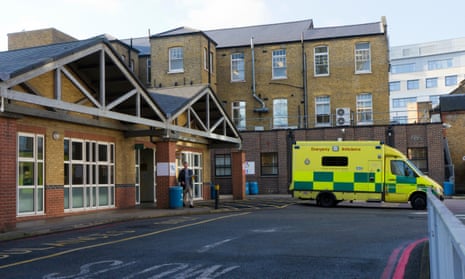An NHS trust’s approach to charging “overseas” patients for healthcare may have scared people away from seeking treatment, with domestic violence survivors hit with bills for thousands of pounds and one patient ending up on the streets, a report has found.
Lewisham and Greenwich NHS trust (LGT) apologised for “any instances where patients were not treated with compassion, or in a manner consistent with the values of [the] trust”, and accepted all but one of the report’s 39 recommendations.
The report was produced by a panel including trust officials and local campaigners, having been commissioned in the wake of controversy over a pilot scheme in which the credit reference agency Experian played a role in checking the eligibility of the trust’s patients for free non-emergency care.
Campaigners for migrant rights welcomed the report, but warned similar situations to the one at LGT existed at NHS trusts across the country as hospitals implemented government rules to charge patients who are not “ordinarily resident” in Britain for non-emergency care. These charges often affect people whose immigration status is unclear or under review.
In the report, the trust said the “ethical, financial and clinical tensions” arising from the charging regime “are unlikely to be fully resolved without radical redesign of the current patient charging framework”, which is set by the government.
The report said the panel had “received details of a number of instances when the trust’s approach to patient charging may have resulted in patients feeling uncomfortable, scared or unable to seek timely treatment and/or choosing to go to other hospitals for their care”.
In a case from 2019, a pregnant woman who was charged for antenatal care told the trust she could not afford to pay, but agreed a repayment plan with a deposit borrowed from a friend. In the later stages of her pregnancy, she became destitute and ended up homeless on the street. The woman was not allowed to work due to her immigration status.
Another case involved Chioma, a domestic violence survivor who came to Britain in 2016.
She was not told about potential charges when she started receiving antenatal care, but five months after giving birth in June 2019 she received a letter from the trust out of the blue, demanding £15,480.
“It wasn’t something that I was expecting,” she told the Observer. “When I opened it to read I remember slumping on the foot of the stairs and just screaming. I had a panic attack at that point because I was like, ‘How do I afford this? Where do I start from?’”
She offered to start repayments at £30 a month, but the trust would not accept anything less than £100 a month, at a time when her total monthly income was the £500 she received from the council to cover her and her newborn daughter’s living costs.
She said a representative of the trust’s “overseas visitor team” was unsympathetic. “I just remember her giving me the vibe like ‘it’s none of my business, you just need to pay this amount’. And I remember feeling like, ‘what do you actually want me to do?’”
She now has extended leave to remain and has found work. “At the time, I couldn’t afford the £100 monthly payment, but I’m here now, I’m working, I’m paying my taxes, I’m contributing to the economy. My daughter is doing very well, as well. So if I wasn’t given the care at the time or if we didn’t have that access, I wouldn’t be here contributing to the economy.”
After the campaign group Maternity Action got involved, the trust agreed to waive the fee – but it could still affect future visa or immigration applications to the Home Office.
Hera Lorandos of the Lewisham Refugee and Migrant Network said: “The charging practices of Lewisham and Greenwich NHS trust do not exist in a vacuum; they mirror the practices of many other trusts across the UK. The practices are an inherent result of the hostile environment legislation which forces NHS trusts into becoming border guards.
“Trusts now have to demand documentation, force people into crippling debt, deny treatment and share patient information with the Home Office. This only serves to break the promises of universal healthcare, inevitably spreading fear and distrust that prevents many from getting lifesaving healthcare.
“We welcome the measures the trust has taken to reduce the damage the policy causes, but we remain resolved to end this discriminatory and harmful policy completely.”
A spokesperson for Lewisham and Greenwich NHS Trust said: “Over the last 18 months, we have worked closely with patient groups and partners to review our arrangements for charging patients who are not always eligible for free NHS treatment. We’ve made a number of changes to ensure that we act in an empathetic, compassionate and supportive way towards these patients, and apologise for any instances in the past where this was not the case.”
The Department for Health and Social Care had not responded to a request for comment by the time of publication.
